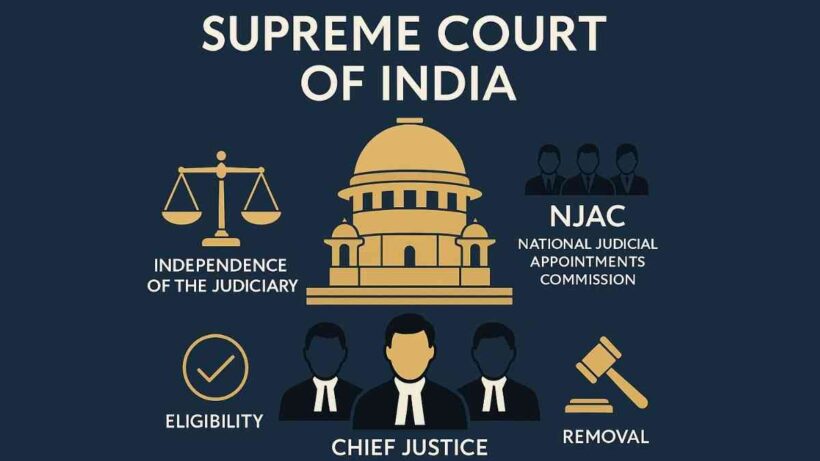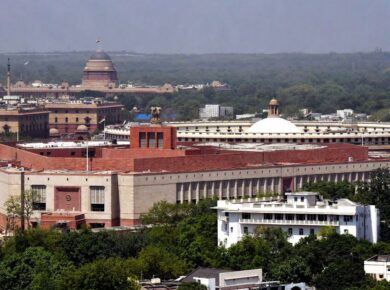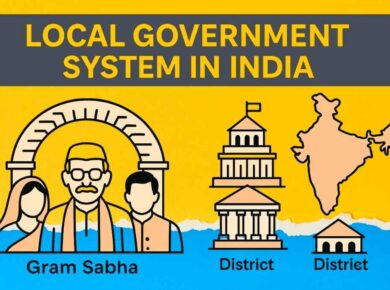Supreme Court – India
“Independent Judiciary > Sine – Qua – Non of Democracy (Absolutely needed)”
- Exist to see that laws made by legislature are intra vires (with the constitution)
- At the apex lie SC > Custodian & interpreter of constitution
- Originally 1 CJ & 7 judges, but at present 1 CJ & 30 Judges
Appointment & Transfer of Judges – By National Judicial Appointments Commission
Composition of the NJAC – 6 members
- Chief Justice of India (Chairperson, ex officio)
- Two other senior judges of the Supreme Court next to the Chief Justice of India – ex officio
- The Union Minister of Law and Justice, ex-officio
- Two eminent persons (one of which would be from the SC or ST or OBC or Minority communities or a woman), for 3 years, not eligible for re-nomination, to be nominated by a committee consisting of:
- Chief Justice of India
- Prime Minister of India
- Leader of opposition in the Lok Sabha (where there is no such Leader of Opposition, then, the Leader of single largest Opposition Party in Lok Sabha)
Functions of the Commission
- Recommending persons to president for appointment as
- Chief Justice of India,
- Judges of the Supreme Court,
- Chief Justices of High Courts and other Judges of High Courts.
- Recommending transfer of Chief Justices and other Judges of High Courts from one High Court to any other High Court
- Ensuring that the persons recommended are of ability and integrity.

Eligibility Criteria of Supreme Court Judges
- Citizen of India
- Judge of HC for atleast 5 years in succession / advocate of HC for atleast 10 years in succession
- A distinguish jurist in opinion of President (a highly qualified academia / law professor)
Also read: Working Procedure of Parliament
Tenure of Supreme Court Judges
- 65 years for Supreme Court Judge
- 3 years more than that of High court Judge
Salary of Supreme Court Judges
- Chief Justice > 1 lakh
- Other Judges > 90,000
- From consolidated fund of India
Advertisement: World’s fastest hosting – secure, reliable, limited-time offer! Click now!
Removal of Supreme Court Judges
By order of President, after an address in each house of parliament, supported by a majority of total membership of the house & passed by a resolution supported by not less than 2/3rd of the members present & voting.
| Lok Sabha | A motion can be preferred before the house if signed by 100 members |
| Rajya Sabha | A motion can be preferred before the house if signed by 50 members |
- Only on grounds of proven misbehaviour or incapacity
- Only after giving 14 days prior notice to said Judge against whom the motion is passed
- A 3 persons judicial committee is formed headed by serving judge of SC + 2 others from (SC or HC or eminent jurists)
- Report of same must be passed by both the houses & President.
Acting CJ & Ad Hoc Judges
Appointment of Acting CJ > By President if CJ is ill or incapable to serve
Appointment of Ad-hoc Judges
- IF there is lack of quorum of Judges of SC to hold or continue any session in court, CJ of India with previous consent of President & after consultation with CJ of HC concerned, request in writing the attendance of judges to sit in SC as ad-hoc judges for certain period (Judges shall be qualified to be judges of SC)
- Retired judges of SC can sit in SC as adhoc Judges on request of CJ after consent of President, provided they fulfill the criteria of SC
Note
- Criminal proceedings initiation against a judge of SC or HC requires CJs consent.
- After retirement, a Judge of SC is prohibited from practising or acting as a judge in any court.
If you’re passionate about building a successful blogging website, check out this helpful guide at Coding Tag – How to Start a Successful Blog. It offers practical steps and expert tips to kickstart your blogging journey!
For dedicated UPSC exam preparation, we highly recommend visiting www.iasmania.com. It offers well-structured resources, current affairs, and subject-wise notes tailored specifically for aspirants. Start your journey today!






